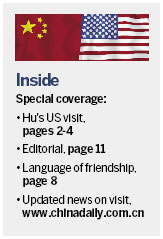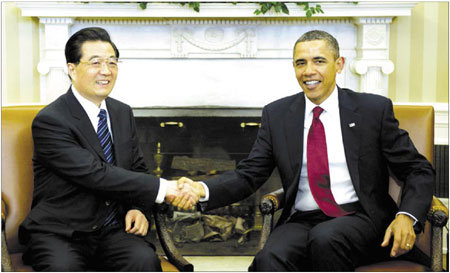US
Nations take steps toward FDI treaty
Updated: 2011-01-20 13:44
By Wu Jiao and Tan Yingzi (China Daily)
|
|

WASHINGTON - In a joint statement issued on Wednesday, the United States sought to assuage China's worries over its holdings of US debt, while China attempted to placate the US on intellectual property rights and their large trade surplus.
A partnership with increased communication and cooperation, the statement said, is aimed at ensuring "strong, sustainable and balanced growth" for both countries and the world.
To pacify China's unease over the safety of its holdings of US treasury bonds, the US stated that it will "focus on reducing its medium-term federal deficit and ensuring long-term fiscal sustainability, and will maintain vigilance against excess volatility in exchange rates".
But the US has been clamoring over its large trade surplus with China. The Chinese government promised in the joint statement to "intensify efforts to expand domestic demand, to promote private investment in the service sector, and to give greater play to the fundamental role of the market in resource allocation".
The two countries are engaged in bilateral investment treaty negotiations to establish the terms for private investment by companies from the US in China and vice versa. This type of investment is usually viewed as a foreign direct investment.
All registered businesses in China are enjoying equal treatment, said President Hu Jintao while he and US President Barack Obama met at the White House with Chinese and American business leaders from Microsoft, Goldman Sachs, Motorola, GE, Coca-Cola, Boeing, The Carlyle Group as well as Lenovo, China Investment Corp, Wanxiang Group and Haier.
"The Chinese government protects intellectual property rights of all registered businesses in China and will not link its innovation policies to the provision of government procurement preferences," Hu said.
While China wants Chinese businesses to invest in the US, Hu said he hoped the Obama administration will provide a fair environment for Chinese firms.
In their meeting, Obama said the US and China have a lot of potential in developing economic and trade relations.
The Chinese currency has remained a contentious issue. China reiterated in the document that it will maintain its exchange rate reform and make the yuan more flexible.
"The statements about intellectual property protection and government procurement sound quite promising," said Philip Levy at the American Enterprise Institute. "It remains to be seen how much this translates into new action. This stops short of a really dramatic move, like China's adoption of the WTO agreement on government procurement."
China Daily
Specials

President Hu visits the US
President Hu Jintao is on a state visit to the US from Jan 18 to 21.

Ancient life
The discovery of the fossile of a female pterosaur nicknamed as Mrs T and her un-laid egg are shedding new light on ancient mysteries.

Economic Figures
China's GDP growth jumped 10.3 percent year-on-year in 2010, boosted by a faster-than-expected 9.8 percent expansion in the fourth quarter.
